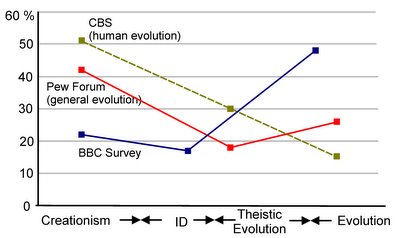The BBC reports that a survey of public attitudes towards evolutionary theory, taken to coincide with an episode of Horizon about Intelligent Design (ID), found that only 48% of the people questioned thought evolutionary theory ‘best described their view of the origin and development of life’, whereas 17% and 22% opted for ID and creationism, respectively.
ID watchers over the other side of the Atlantic are scratching their heads at our apparent eagerness to join them on a ride down the slope of scientific illiteracy, but I’m not sure it’s as bad as all that, as I’ll discuss in a moment. First, however, I’ll briefly review the Horizon which prompted it. The piece was entitled ‘A War On Science’, and examined the ID movement mainly through the lens of the recent Dover Trial. We got to meet all of the design big guns: Philip Johnson, Stephen Meyer, Michael Behe and William Dembski (I was most entertained by the fact that Behe was interviewed in a fairground – an interesting choice!). Their arguments were mainly addressed by Ken Miller (whose simple rebuttal of Dembski’s post-hoc mathematical handwaving was especially good), with some support from people more recognisable to us Brits: Richard Dawkins came across much better than he did in his own programme (and had the best put-down, with his complaint that in all of science, it was only in biology that researchers had to waste time battling ‘the yapping terriers of ignorance’); and it was especially nice to have David Attenborough weigh in, and strongly too, on the side of empirically supported science.
This was all reasonably good, but problems arose towards the end of the programme, as we awaited the outcome of the Dover Trial and the narrative tried to ramp up the tension. As it did so it blurred the distinction between the effect the result might have on the opinions of the scientific community (i.e., none) and its wider cultural impact (given that many of the interviews seemed to have been done before or during the trial itself, I think the producers may have been expecting the reverse decision and were collecting material for ‘The Day Science Died’). The implication that the courts are the ultimate arbiter of things scientific is, of course, completely wrong. Nonetheless, the whole ID thing has much less exposure over in the UK than in the US (I’m just a strange Panda’s Thumb addict), and I think in that context it was a pretty good introduction.
With that it mind, what is the meaning of this survey? Personally, I feel there’s some room for ambiguity in these results, because I don’t think many people in the average UK street would actually know what ID is. How many of the 17% who opted for ID knew what it was before they were asked about it? The BBC definition (which may or may not have been the one used by the survey) is:
Intelligent design is the concept that certain features of living things are so complex that their existence is better explained by an "intelligent process" than natural selection.
This is fine if you already know what ID is, but to the less aware would be quite easy to mix up with some sort of ‘guided evolution/God probably had something to do with it somewhere’-type theism. Of course, without knowing the specific questions that were asked, it’s hard to know for sure.
Gloom can also be offset by comparison to two recent survey results from the USA, here (which asked specifically about views on human evolution) and here. It isn’t possible to compare the results from these surveys in a completely objective way, because they asked slightly different questions and allowed for slightly different responses, but I’ve given it a go in the chart below: the horizontal axis plots response groups from the three surveys according to how ‘sciency’ their views are (or how ‘godly’ they aren’t).

The distribution of opinion for the UK survey is almost a mirror image of that in the States – if the Stateside bloggers found 48% of their own citizens were suddenly evo-friendly, I think they’d be cracking open their beers in celebration…
The other reported part of the survey, which appears more worrying at first glance, asks the respondents, from the three alternatives, ‘which one or ones they would like to see taught in science lessons in British schools’ (my emphasis). While 69% wanted evolution taught, ID and creationism also garnered 41% and 44%, respectively. Because people could choose one, two, or all three, without further information on the distribution of responses it’s difficult to assess what’s going on. I strongly suspect that people who thought creationism should be included were also keen on ID (as an ‘at least’ option) and there will be very little overlap between evolution and ID/creationism voters. I could be wrong of course, and 40% of people wanting to stick apologetics into science class is still worryingly high (unless people were thinking along the lines of showing how Darwin overturned the creationist model - I covered heliocentrism in GCSE Physics in a similar fashion). Hopefully the pollsters will clear everything up at some point by publishing the results in more detail, including what they actually asked!




No comments:
Post a Comment